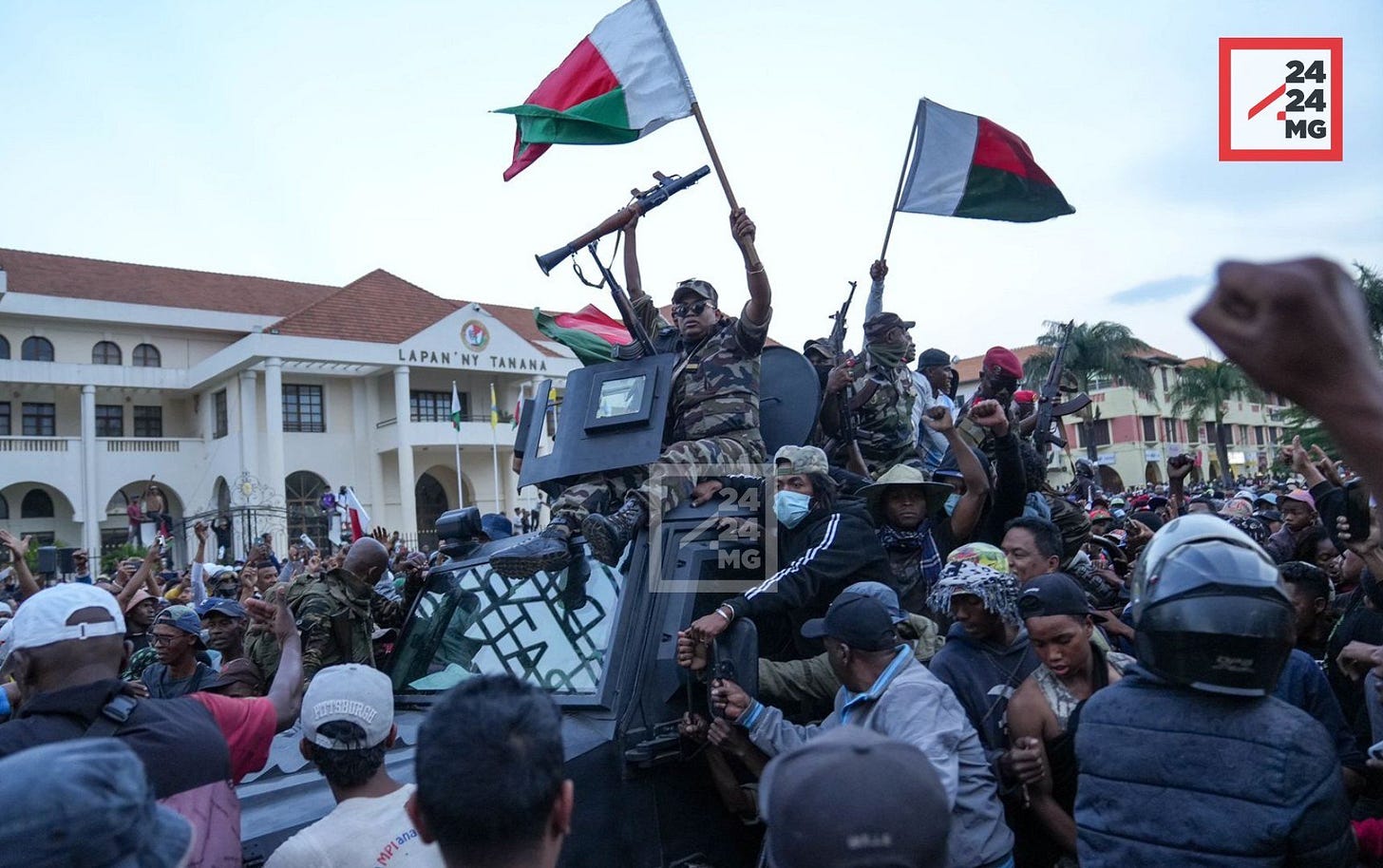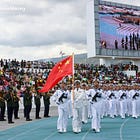Political Turmoil In Madagascar Highlights The Risks Of And Limited Options For Expanded Overseas Chinese Military Presence
🇨🇳 🇲🇬 Commentary
Commentary-themed posts are intended to broach or highlight a specific issue, not limited to recent and ongoing events. These posts will typically be much shorter and less detailed than analysis-themed posts.
The ongoing political turmoil in Madagascar serves as a reminder of the risks that China faces in expanding its overseas military presence. A small contingent of Chinese military personnel forward-deployed at the Chinese military base in Djibouti was dispatched to Madagascar in June 2025 to participate in the island country’s sixty-fifth anniversary of independence from France.
A small contingent of Chinese military personnel was more recently caught up in political turmoil in Nepal.
These incidents highlight the risks that Beijing faces should it pursue an expanded non-exclusively naval overseas military presence. As I explained in both of the above-linked posts, China’s global rapid response capabilities are limited, and People’s Liberation Army (PLA) personnel caught up in political turmoil may have to fend for themselves while Beijing tries to exert pressure upon key players in a chaotic and rapidly changing political environment to not only secure its interests but also safeguard the safety of lightly-equipped PLA personnel. It bears emphasis that China’s penchant for establishing close economic and military ties with politically fragile, if not unstable, countries in sub-Saharan Africa and elsewhere in the world does Chinese decision-makers few favours when it comes to significantly expanding China’s overseas military presence without assuming considerable risk.
The ongoing political turmoil in Madagascar is, I think, also important for Chinese decision-makers and observers following the Chinese military for at least one other reason: Madagascar occupies prime maritime real estate that China may turn to should it seek to expand its military—not just naval—presence in not just the southern Indian Ocean and southeastern Africa, but also the Atlantic Ocean. A Chinese naval base in Madagascar, for example, can be used to support the (hypothetical) deployment of People’s Liberation Army Navy (PLAN) nuclear-powered submarines in the Atlantic Ocean in the 2030s and beyond. The presence of Chinese nuclear-powered attack submarines, particularly submarines that are equipped with a dozen or more vertical launch cells and long-range (conventionally-armed) strike munitions, will likely have the effect of upending American military planning assumptions by diverting scarce anti-submarine warfare and air defence capabilities to the Atlantic Ocean that will be of crucial importance in the Western Pacific and across the Pacific Ocean more generally.
As of October 2025, the PLAN’s nuclear-powered submarine force is so limited in terms of both quality and quantity that the notion of Chinese nuclear-powered attack submarines operating in the Atlantic Ocean in the 2030s and beyond may understandably sound far-fetched. It is, however, possible that the very significant expansion of production facilities at the Bohai Shipyard—and ongoing advances in Chinese submarine technology more generally—will eventually result in a dramatic expansion of Chinese nuclear-powered submarine construction as we head into the 2030s. As a result, the notion of Chinese nuclear-powered attack submarines operating in the Atlantic Ocean in the 2030s and beyond may not be as far-fetched as it may appear at first glance. Given the immense distance that Chinese submarines and, more generally, surface ships have to cover to reach the Atlantic Ocean without transiting the Suez Canal and the Strait of Gibraltar, a route that the existing Chinese military/naval base in Djibouti is well-positioned to support, the PLAN will likely require a base that can provide logistical support for PLAN submarines operating in the southweestern Indian Ocean and the Atlantic Ocean. Madagascar and the nearby Comoros, another island country to which a small Chinese military contingent was recently dispatched to participate in a national military parade, are two candidates for such a Chinese naval base, which will likely have to be supported by another Chinese naval base located along Africa’s western coast, perhaps in Angola, Equatorial Guinea, or Gabon.
It is, of course, far too easy to look at a map and identify suitable locations for Chinese military bases in Africa and elsewhere. The fact is that most countries have considerable agency to refuse a Chinese request for a military base, not least in a diplomatic environment in which countries can increasingly trade ties with Beijing to curry favour with other countries that are opposed to increased Chinese influence, let alone a Chinese military presence. Djibouti was and remains an outlier, not least in the peculiar context of the early to mid-2010s, given the excellent maritime real estate occupied by Djibouti for countries interested in counter-piracy naval deployments and, no less importantly, Djibouti’s adept ability to play the likes of China, France, and the United States against one another. It is no accident that the Chinese military/naval base in Djibouti is located around 10 kilometers from the nearest American military base. Elsewhere in the world, including sub-Saharan Africa, China faces much greater challenges in securing access for an expanded military presence, let alone a significant permanent military/naval base.
In the case of Madagascar, it bears emphasis that the candidate host country is economically underdeveloped and has an impoverished population, conditions that do not lend themselves to political stability and ultimately result in a situation in which strong Chinese ties with an ineffective and unpopular government risk a rupture in bilateral relations following political turmoil. A country like Madagascar can also play China against the likes of India and the United States, so as to not only extract greater concessions from Beijing in exchange for a military base but also potentially curtail the scope of any potential Chinese military presence so that Madagascar can continue to simultaneously extract concessions from the likes of India and the United States.
Given the above, Chinese decision-makers face considerable risks and, more importantly, have limited options for an expanded overseas military presence. Given the prevailing diplomatic environment, China will likely have to offer ever sweeter deals so as to get countries to agree to a Chinese military presence in a context in which their bilateral ties with other countries, such as India and the United States, are likely to take a significant hit. As it concerns overseas military bases, the lowest-hanging fruit available to Chinese decision-makers are primarily politically fragile, if not unstable, countries with governments that have few other options and little to lose, countries that are, like Madagascar, likely to undergo political turmoil that PLA personnel may be caught up in. For all its wealth and influence, Chinese decision-makers encounter a seller’s market when it comes to securing access for an expanded Chinese overseas military presence in countries that are not politically fragile or unstable.




